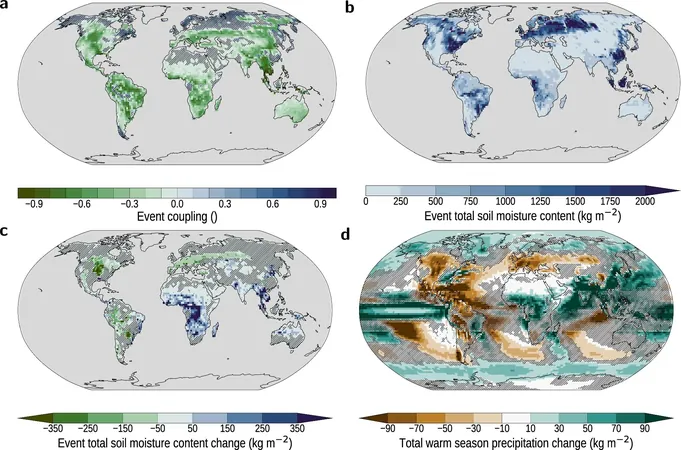
Brace Yourselves: Heat Waves Are About to Get Even More Intense!
2025-01-20
Author: Benjamin
Recent Findings
Recent research has revealed shocking findings about the future of heat waves, particularly in Eastern North America and Central Europe. A groundbreaking study suggests that as soil moisture alters due to climate change, the severity of the most extreme heat waves in these areas could become twice as intense as previously anticipated.
Study Overview
Led by Professor Douglas Maraun from the University of Graz, the study, published in *Nature Communications*, demonstrates that a global temperature rise of just 2°C could result in the hottest heat events in these regions increasing by an alarming 4°C. This revelation comes in light of catastrophic heat waves that have already impacted millions: the searing droughts in Canada in 2021, the devastating heat in India last year, and the blistering Mediterranean summer of 2023.
Expert Insights
Co-author Reinhard Schiemann, a research scientist at the University of Reading, emphasizes the importance of soil moisture in this equation. "While it's a well-known fact that heat waves intensify with rising average temperatures, what we didn’t fully grasp was how the most extreme heat waves would react to temperature changes compared to moderate ones. Soil moisture variability during extreme heat events plays a pivotal role," says Schiemann.
Understanding Soil's Role in Heat Intensity
The research identified three critical soil moisture states that impact temperature outcomes: very wet soil, where moisture barely affects temperatures; very dry soil, which lacks a cooling effect; and an intermediate state, where soil moisture significantly influences heat intensity.
As climate patterns evolve, these regions can easily transition between these states. For instance, areas that are currently wet may exhibit drier conditions, shifting into that crucial intermediate state where soil plays a dominating role. The consequences? In places like Central Europe and Eastern North America, we could witness heat waves becoming far more extreme than earlier predictions. Conversely, already arid regions might experience less severe temperature spikes if they get increased rainfall.
Climate Model Analysis
The research team meticulously analyzed various climate models, focusing on how soil moisture fluctuates during peak heat periods. With expected changes in rainfall patterns across different regions, the interaction between soil moisture and temperature will significantly shape future heat extremes.
Conclusion
This significant study underscores a pressing reality: current climate risk assessments need urgent revisions. The findings suggest that many regions may be underestimating the potential intensity of future heat events, a stark reminder of the urgent action needed to tackle climate change.
Prepare for the heat—it's about to escalate in ways we never expected!









 Brasil (PT)
Brasil (PT)
 Canada (EN)
Canada (EN)
 Chile (ES)
Chile (ES)
 Česko (CS)
Česko (CS)
 대한민국 (KO)
대한민국 (KO)
 España (ES)
España (ES)
 France (FR)
France (FR)
 Hong Kong (EN)
Hong Kong (EN)
 Italia (IT)
Italia (IT)
 日本 (JA)
日本 (JA)
 Magyarország (HU)
Magyarország (HU)
 Norge (NO)
Norge (NO)
 Polska (PL)
Polska (PL)
 Schweiz (DE)
Schweiz (DE)
 Singapore (EN)
Singapore (EN)
 Sverige (SV)
Sverige (SV)
 Suomi (FI)
Suomi (FI)
 Türkiye (TR)
Türkiye (TR)
 الإمارات العربية المتحدة (AR)
الإمارات العربية المتحدة (AR)